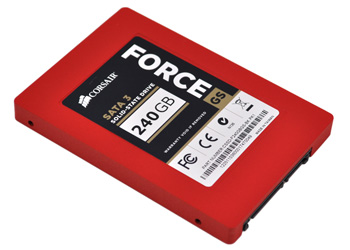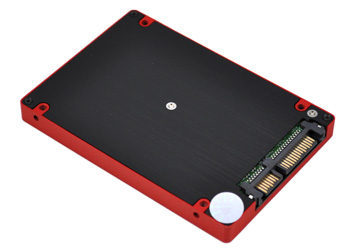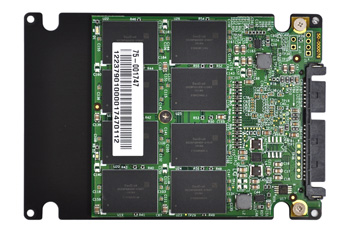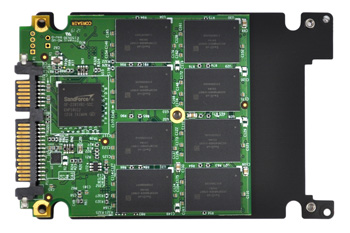Introduction
When it comes to the varying flavours of solid-state drives, Corsair is leaving no stone unturned. A quick look through the company's product range suggests that the goal is to cover all bases; the Accelerator cache is a low-cost and competent drive, the Performance Pro is a rock-solid SSD based around a tried-and-trusted Marvell controller, and Corsair's high-end SandForce solutions now come in three unique flavours.
The Force Series 3 takes the ultra-fast LSI SandForce SF-2281 controller and pairs it with cheap-and-cheerful asynchronous NAND, the Force Series GT partners the controller with quicker synchronous NAND and the new Force Series GS has the very same controller working in tandem with premium Toggle Mode NAND for optimum performance.
Corsair describes this three-fold line up as "fast, faster, and fastest," so anyone who's in the market for a blisteringly-fast SSD should have the Force Series GS on their radar; it's Corsair's flagship drive - at least until the intriguing Neutron Series arrives on the scene.
Following on from where the Force GT left off, the top-of-the-line GS drives are finished in eye-catching red and the colour's a real treat for users of, say, an ASUS RoG motherboard or an AMD Radeon graphics card. Of course, there's a good chance the bright red finish won't suit your build, but if you're going to make an SSD appear fast right from the off, this is probably the colour to do it.
As you'd expect from an LSI SandForce-powered drive, the Force GS is armed with a SATA 6Gbps interface and built-in TRIM support, and Corsair has a choice of 180GB, 240GB, 360GB and 480GB capacities, priced at around £135, £170, £245 and £335, respectively.
Interesting to note, also, that Corsair isn't producing smaller-capacity Force GS drives. Anyone seeking capacities of 120GB or less will need to divert their attention to the Force GT or Force 3 models; the Force GS is strictly for the enthusiast willing to spend over £135. Though, even then, average pricing of around 70p-per-gigabyte is keen and in keeping with recent price cuts. A drop in NAND memory pricing has rapidly driven down the cost of solid-state drives in recent months, so much so that it would have been unimaginable to see a flagship Corsair drive at this price point just a year ago.
But affordability isn't the Force GS' primary focus; this is an SSD built for optimum speed and that ambition dictates the drive's internal make-up. The ubiquitous LSI SandForce SF-2281 is identical to that of the Force GT and Force 3 models, but the Force GS differentiates itself with a scattering of SanDisk's 24nm Toggle Mode NAND. This particular combination makes the Force GS practically identical to SanDisk's Extreme SSD, which isn't necessarily a bad thing as the latter has proven to be mighty quick.
What's all the fuss about Toggle Mode NAND? Well, SandForce-powered drives are famed for their top-line speed, but they're also known to suffer when working with incompressible data. In these scenarios, the extra performance of Toggle Mode NAND should help bump-up drive performance, particularly during random-write-intensive tasks.
Breaking that additional potency down into specifics gives each 240GB Force Series drive the following specification:
| 240GB Force Series 3 | 240 GB Force Series GT | 240GB Force Series GS | |
|---|---|---|---|
| Max. sequential read speed (MB/s) | 550 | 555 | 555 |
| Max. sequential write speed (MB/s) | 520 | 525 | 525 |
| Max. random 4k write (IOPs) | 85k | 85k | 90k |
| NAND type | Asynchronous | Synchronous | Toggle Mode |
| Max. power consumption (Watts) | 2.0 | 4.6 | 4.6 |
| Warranty | 3 years | 3 years | 3 years |
The Force GS is the pick of the bunch as far as ultimate performance is concerned, but the problem for Corsair is that the drive isn't really that exciting. It's certain to be fast, there's no doubt about that, but the SandForce-plus-Toggle-Mode-NAND combination isn't anything new, and competitors who have beaten Corsair to this particular punch offer similar alternatives for less money. SanDisk's 240GB Extreme SSD is roughly £20 cheaper, going by today's prices, and, other than the Corsair brand, the average consumer will see little reason not to choose the cheapest available option.
Each Force Series GS drive is backed by a decent-if-not-exhaustive three-year warranty and comes bundled with a 3.5in mounting bracket, but there's no disk-migration software included as part of the package. A personalised firmware may show a couple of nuances in terms of performance, but if you're hoping to see Corsair deliver something truly unique, you'll have to wait for the upcoming Neutron SSDs, powered exclusively by a new controller developed by Link a Media Devices (LAMD).
But if you've decided to spend your hard-earned on the best that LSI SandForce has to offer, let's run the 240GB Force Series GS through our benchmarks and see how it fares.













